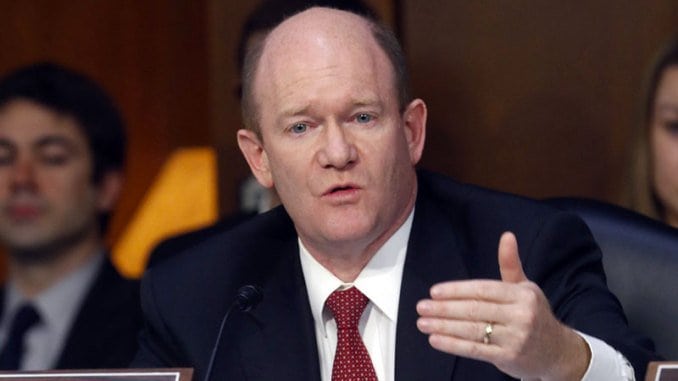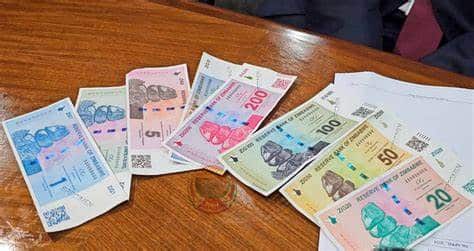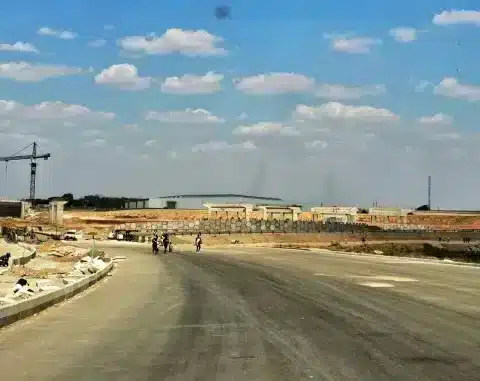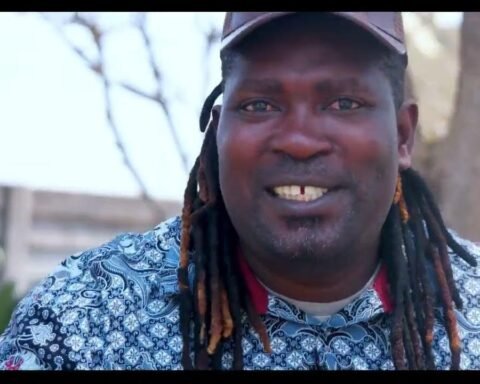Harare, April 8, 2018: A five member delegation of U.S. Senators visited Zimbabwe 6- 8 April. The delegation consisted of Senators Chris Coons, Jeff Flake, Cory Booker, Michael Bennet and Garry Peters, all members of the Senate Foreign Relations Committee. The visit by the Congressional Delegation comes at a time when Senators Coons (D-Del.) and Flake (R-Ariz.) introduced a bill to lay the framework for U.S. relations with the new government in Zimbabwe. The proposed legislation updates the Zimbabwe Democracy and Economic Recovery Act (ZDERA) of 2001 and sets forth the steps Zimbabwe needs to take to have targeted sanctions lifted. On their visit to Zimbabwe, the delegation met civil society, political parties and representatives of government including President Emmerson Mnangagwa. Below is a transcript of the media briefing held in Harare on April 7 2018.
START:
Charge d’ Affaires Jennifer Savage: Good afternoon. It is a real pleasure to see all of you here. We are so pleased to see so many of you. The media plays such a huge role in supporting free and fair elections. Your observation and your reporting is a critical part of that. So we are so pleased to have so many of you here and interested. It is my pleasure to have so many of you here to join in welcoming Senator Coons, Senator Flake, Senator Booker, Senator Peters and Senator Bennet to Zimbabwe. With that let me turn it over to Senator Coons.
Senator Chris Coons: Thank you Jennifer. Thank you very much for your support and for everything that the staff at the U.S. Embassy has done to make this terrific trip possible. I’m here leading a delegation of five senators. We are both Republicans and Democrats. We are from States all over the United States and we were excited, we were thrilled to see the people of Zimbabwe go to the streets to celebrate change. And we came to listen, and learn. We have met with a very wide range of Zimbabweans and we are excited to go from here to meet with the President and the Foreign Minister.
So let me speak briefly to a few key questions- some things that have been covered by you in the press. Senator Flake and I introduced an amendment in the United States Senate that would allow for the lifting of ZDERA, some of the sanctions that have been in place now for 18 years. Our President, President Trump, also may lift some sanctions. And President Mnangagwa has been travelling the world and meeting with heads of state and in March in our New York Times made a very positive, very encouraging statement about the path forward. We are on a journey together. We both are from countries with very strong constitutions. And we believe there are international standards, well known, adopted by the African Union, by SADC, by the EU, by others that show what the steps are from a declaration that we intend to have a free, fair and credible election to having that election; and the steps that follow after an election to re-establishing rule of law, to re-establishing an economic system that is sound; to re-establishing human rights and respect for others. It is not our place to be here to dictate any particular set of paths or steps but to say we are excited about and welcome a new journey forward with the people of Zimbabwe. What we have seen here and what we have heard here so far reinforces our great optimism about the future because the people of Zimbabwe are among the best educated in the world. They are from a country blessed with amazing human resources and natural resources and we thing we can make terrific progress together. So, I wanted to simply say ‘thank you.’ As we said in the beginning, a free and robust press is an essential part of democracy and we will take a few of your questions before we depart to meet with the President. Senator Flake…
Senator Jeff Flake: Masikati (Good afternoon). It’s so good to be here. I was first in Zimbabwe 35 years ago, I spent six months here- great time of my life I can tell you. Not only were people celebrating in the streets here in November but many who love this country were…in the world as well. We are so happy to be here- to listen and to learn. Senator Coons, Senator Booker and I chair the Africa Sub Committee and we are very interested in what’s going on now. We are proud to be part of a great U.S. presence here that is only becoming larger with a large embassy being constructed. Our engagement has never ended but will be heightened and extended in the future. So we are very excited about free and fair and credible elections coming up and we are looking forward to our meeting with the President and Foreign Minister to discuss that further. Thank you.
Question: My name is Godwin, may be so far from your interactions; any changes apart from the celebrations that we witnessed last year from any engagements that you have had?
Senator Coons: I will say that across a wide range of conversations from civil society, from people in business, from people with long standing relations between the United States and Zimbabwe, we are hopeful, but it is also clear that there are some actions that are overdue that need to be taken in order to begin moving towards free, fair and credible elections; and we look forward to discussing this in detail this afternoon and to having the will of the people of Zimbabwe respected and heard through the press and through upcoming elections.
Question: I am Columbus Mavhunga from Deutsche Welle Radio. From the stakeholders that you have met, what are the concerns that are coming out? That’s one. And what will it take for your Senate to lift smart sanctions on Zimbabwe’s leadership?
Senator Coons: …I am intentionally saying that it is a journey that we are on together. Free, fair and credible elections are not the end of that journey, they are a midpoint. We do believe that we can have, and we are excited to have a more expanded relationship. So we shouldn’t look at the possible reduction or lifting of sanctions as the endpoint, or perhaps as a midpoint. We have heard lots of different suggestions from different parties, from civil society, from politicians about the most important thing to do next, this is the most important thing to do next, things must happen with the election laws and the constitution, things must happen with the voting rolls, things must happen with the role of the military in the election. It is not our place I think for us to have a specific menu and timeline. I think there is wisdom among many Zimbabweans where their sense of what must happen in the next few months for there to be progress towards credible elections.
Senator Flake: Senator I would just add to that. The election itself on its own is important but the run up to the election is extremely important. At what point are voters’ rolls released for example, things like that are recognised by so many, by the AU, by SADC and EU and any universal body as building towards a credible and free and fair election. So we want to make sure that there is time for those things to happen and that will be some of the discussions we have later today.
Question: I am Tatira from NewsDay. Sanctions were extended, it was reported that sanctions were extended in February pending a review after the general elections in July. I wanted to find out whether since that time up to now, have you found, do you think that enough effort is being made to meet some of the concerns that were raised by your government? And may be another question is if the situation was ideal what kind of economic partnerships do you think United States and Zimbabwe could have in future?
Senator Coons: So there have been, as I mentioned, some very encouraging statements. The President (Mnangagwa), in his inaugural speech, the editorial I referenced in an American newspaper, the New York Times– very encouraging and laid out a commitment to a whole series of actions and some of those actions have happened. But some of the most important actions required for there to be progress towards the conditions for a free and fair and credible election have not yet happened. What sort of partnership would the United States hope for with Zimbabwe? We would hope to have expanded economic ties. There are already terrific relations between the people of Zimbabwe and the people of the United States. Many Zimbabweans are educated in the United States; there are many Americans who have come here and had amazing experiences and their lives changed. We would hope to expand the people to people relationships, relationships between companies, universities, hospitals, researchers but also much more investment from the United States to reviving the economy; to rebuilding the infrastructure and to advancing the country. But this is a journey and there are steps that have to happen in the near term. To be clear, there are some sanctions that have been imposed and re-imposed by our President, by the Executive. There are others, ZDERA that have been imposed, 18 years now by the legislature. Not all of these will be removed by one or the other. It’s a process where both branches, main branches of the three arms of the American government, which don’t always agree on everything but on this we agree about our optimism for democracy but the steps that must happen before we would take a step back.
Question: My name is Lincoln Towindo from the Sunday Mail. You mentioned that sanctions have been in place for the past 18 years. In your opinion do you think they have achieved the desired goal?
Senator Coons: None of us remembers in Congress when ZDERA was enacted. But I have met with and spoken to one of the authors of ZDERA, a friend and predecessor Senator Feingold. One of the difficulties of sanctions is that they often have unintended secondary consequences. It is often working people, average people who suffer the economic consequences. But I do think they got the attention of the leadership of Zimbabwe and it gives us an opportunity now to reconsider where we are and to hope for a much better future. One where there is not just an elimination or reduction of sanctions but where that’s the penultimate step towards having a much more expanded and robust economic partnership.
Senator Flake: I don’t want to speak for everybody but I probably do. Nothing would please us more than to be able to play a role in the legislative branch and also to recommend to the President that conditions are such that these sanctions are to all be lifted. And that the U.S. and Zimbabwe cannot just have full diplomatic relations as we do now but full commercial ties and to have expanded presence, trade here and also remove individuals from that sanctions list. But that very much depends, as we all know, on what happens in the coming months.
Question: Senator, I am Mugove Tafirenyika from the Dailynews. You spoke about important steps that must be taken that have not yet been taken to ensure a free, fair and credible election. What sort of, what are these steps that are important that have not been taken so far?
Senator Coons: There are democratic elections in many countries around the world. Senator Flake referenced how the African Union, SADC have set out expectations about what sort of things happen in terms of voter registration; in terms on non-interference by the military; in terms of having a series of steps that are published in transparent and predictable about how a national election commission is going to proceed with identifying polling places; but setting up procedures for tabulation. A number of these have not happened. There may very well happen. If there was a core message that we are hoping to send- it is that we are not here to dictate steps and timelines- we are here to say that we are hopeful that these things will happen. The President of Zimbabwe has made very optimistic statements and commitments and we are hopeful that they will be taken promptly. But if a month or two or three goes by and there is no more steps taken along the menu of what is widely accepted of what is required before or after an election for it to be credible then we will be disappointed that this wonderful moment of opportunity may be missed.
Senator Flake: There are also steps or procedures laid out in the Zimbabwean constitution that the election procedures need to be aligned to. And so some of it is already laid out here and I think a few of the steps have been made and other steps still need to be made.
Senator Coons: Thank you so much for a chance to be with you. We look forward to remaining engaged with you in the months ahead. Thank you.
Ends…








